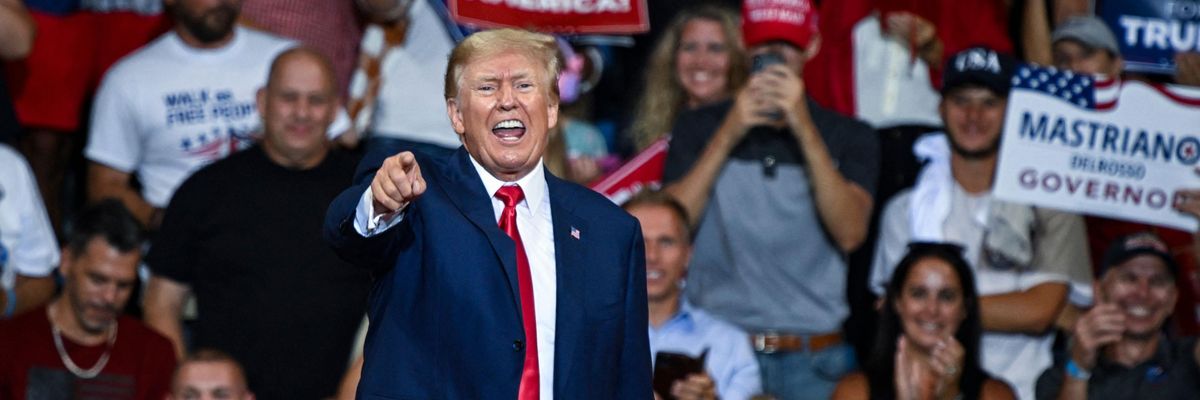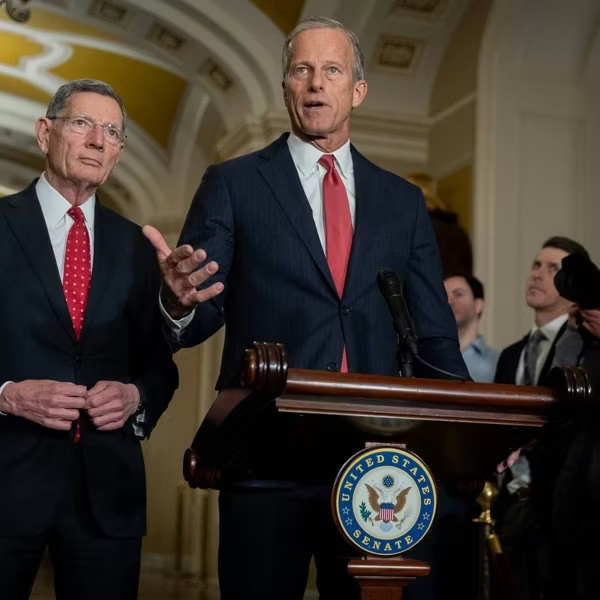
Former U.S. President Donald Trump speaks during a campaign rally in support of Republicans Doug Mastriano for governor of Pennsylvania and Mehmet Oz for U.S. Senate at Mohegan Sun Arena in Wilkes-Barre on September 3, 2022.
Defeating Trump Gives Us a Real Chance to Restore Sanity to the Tax Code
The Trump tax cuts set off a wave of corporate profiteering that never “trickled down” to the rest of us. Soon we’ll get a chance to fix that—but only if the Republicans are soundly defeated.
Next year, we’ll have to make one of the most important decisions about the future of our economy. Will we hand more power and wealth to big corporations and the rich — or invest in a healthy and resilient economy that works for all of us?
In 2017, Republican lawmakers passed tax loopholes and cuts that primarily benefited the wealthy and big corporations. President Trump signed these giveaways into law, spiking inequality and setting off a wave of corporate profiteering.
Next year, parts of that law will begin to expire, which gives us the opportunity to make changes.
For decades, both parties have created an economy where big corporations and the wealthy aren’t pitching in like the rest of us. We’ve been sold a bill of goods known as “trickle down” economics. Trickle down goes like this: Feed the rich the best cut of meat and maybe we’ll get a bit of gristle that falls on the floor — and we’ll thank them for it.
The rich and most profitable corporations aren’t just contributing less and less to our collective coffers. They’re using their power to enrich themselves further while more of us struggle. Senator Elizabeth Warren recently described this as a “doom loop” for our tax code: the wealthy and corporations get richer from tax giveaways and then use their wealth and power to boost their profits — and then lobby for more tax cuts.
For example, the 2017 Trump tax cuts dropped the top corporate tax rate to 21 percent from 35 percent (compared to 40 percent in 1987). Supporters argued this would lead to better wages and supercharge economic growth. Instead, economic growth continued at about the same pace as before the tax breaks. And while 90 percent of workers did not see a raise, billionaire wealth has doubled.
In the same period in which corporations have enjoyed lower taxes, they’ve also raked in record profits. As my colleagues at Groundwork Collaborative have highlighted, lowering corporate tax rates actually incentivized corporate profiteering in the wake of the pandemic, as companies that overcharged us got to keep more of their winnings.
Trickle down theory says these windfall profits and lower taxes should encourage companies to invest more in workers and innovation. But in an economy run by big corporations with enormous market share, that money ends up being funneled to shareholders instead of increasing worker wages, investing in new or more productive technologies, or holding critical inventories in case of a crisis.
If we want corporations to invest more in wages and productive investments, we should raise their taxes, since wages and research are mostly tax deductible.
In other words, corporate profiteering is not a foregone conclusion. Raising corporate taxes has the potential to boost investment, productivity, and economic growth — and get Americans some of their money back.
The Biden administration has taken critical steps to push back against failed trickle down economics and corporate profiteering. It capped the price of essential drugs like insulin, empowered regulators to go after corporations abusing their market power, and made historic investments in a green future. But more can be done by raising taxes on the largest, most profitable corporations.
Fundamentally, the coming tax debate is about who holds the reins in shaping our economy: megacorporations and their wealthy shareholders, or the everyday people who keep the economy humming. Next year is an opportunity for Congress to stand firm against the rich and powerful and build the economy that we want to see.
An Urgent Message From Our Co-Founder
Dear Common Dreams reader, The U.S. is on a fast track to authoritarianism like nothing I've ever seen. Meanwhile, corporate news outlets are utterly capitulating to Trump, twisting their coverage to avoid drawing his ire while lining up to stuff cash in his pockets. That's why I believe that Common Dreams is doing the best and most consequential reporting that we've ever done. Our small but mighty team is a progressive reporting powerhouse, covering the news every day that the corporate media never will. Our mission has always been simple: To inform. To inspire. And to ignite change for the common good. Now here's the key piece that I want all our readers to understand: None of this would be possible without your financial support. That's not just some fundraising cliche. It's the absolute and literal truth. We don't accept corporate advertising and never will. We don't have a paywall because we don't think people should be blocked from critical news based on their ability to pay. Everything we do is funded by the donations of readers like you. Will you donate now to help power the nonprofit, independent reporting of Common Dreams? Thank you for being a vital member of our community. Together, we can keep independent journalism alive when it’s needed most. - Craig Brown, Co-founder |
Next year, we’ll have to make one of the most important decisions about the future of our economy. Will we hand more power and wealth to big corporations and the rich — or invest in a healthy and resilient economy that works for all of us?
In 2017, Republican lawmakers passed tax loopholes and cuts that primarily benefited the wealthy and big corporations. President Trump signed these giveaways into law, spiking inequality and setting off a wave of corporate profiteering.
Next year, parts of that law will begin to expire, which gives us the opportunity to make changes.
For decades, both parties have created an economy where big corporations and the wealthy aren’t pitching in like the rest of us. We’ve been sold a bill of goods known as “trickle down” economics. Trickle down goes like this: Feed the rich the best cut of meat and maybe we’ll get a bit of gristle that falls on the floor — and we’ll thank them for it.
The rich and most profitable corporations aren’t just contributing less and less to our collective coffers. They’re using their power to enrich themselves further while more of us struggle. Senator Elizabeth Warren recently described this as a “doom loop” for our tax code: the wealthy and corporations get richer from tax giveaways and then use their wealth and power to boost their profits — and then lobby for more tax cuts.
For example, the 2017 Trump tax cuts dropped the top corporate tax rate to 21 percent from 35 percent (compared to 40 percent in 1987). Supporters argued this would lead to better wages and supercharge economic growth. Instead, economic growth continued at about the same pace as before the tax breaks. And while 90 percent of workers did not see a raise, billionaire wealth has doubled.
In the same period in which corporations have enjoyed lower taxes, they’ve also raked in record profits. As my colleagues at Groundwork Collaborative have highlighted, lowering corporate tax rates actually incentivized corporate profiteering in the wake of the pandemic, as companies that overcharged us got to keep more of their winnings.
Trickle down theory says these windfall profits and lower taxes should encourage companies to invest more in workers and innovation. But in an economy run by big corporations with enormous market share, that money ends up being funneled to shareholders instead of increasing worker wages, investing in new or more productive technologies, or holding critical inventories in case of a crisis.
If we want corporations to invest more in wages and productive investments, we should raise their taxes, since wages and research are mostly tax deductible.
In other words, corporate profiteering is not a foregone conclusion. Raising corporate taxes has the potential to boost investment, productivity, and economic growth — and get Americans some of their money back.
The Biden administration has taken critical steps to push back against failed trickle down economics and corporate profiteering. It capped the price of essential drugs like insulin, empowered regulators to go after corporations abusing their market power, and made historic investments in a green future. But more can be done by raising taxes on the largest, most profitable corporations.
Fundamentally, the coming tax debate is about who holds the reins in shaping our economy: megacorporations and their wealthy shareholders, or the everyday people who keep the economy humming. Next year is an opportunity for Congress to stand firm against the rich and powerful and build the economy that we want to see.
- Tax Rates for Big Corporations Fell by Nearly Half After Trump Cuts ›
- Blame Bush and Trump Tax Cuts for the US Revenue Problem ›
- Extending Trump Tax Cuts Would Add $4.6 Trillion to Deficit: CBO ›
- GOP Confirms 2025 Tax Plan If Trump Wins: More Giveaways to the Rich ›
- 'Reverse of Robin Hood' 2.0: Trump Vows to Extend Billionaire Tax Cuts If Reelected ›
Next year, we’ll have to make one of the most important decisions about the future of our economy. Will we hand more power and wealth to big corporations and the rich — or invest in a healthy and resilient economy that works for all of us?
In 2017, Republican lawmakers passed tax loopholes and cuts that primarily benefited the wealthy and big corporations. President Trump signed these giveaways into law, spiking inequality and setting off a wave of corporate profiteering.
Next year, parts of that law will begin to expire, which gives us the opportunity to make changes.
For decades, both parties have created an economy where big corporations and the wealthy aren’t pitching in like the rest of us. We’ve been sold a bill of goods known as “trickle down” economics. Trickle down goes like this: Feed the rich the best cut of meat and maybe we’ll get a bit of gristle that falls on the floor — and we’ll thank them for it.
The rich and most profitable corporations aren’t just contributing less and less to our collective coffers. They’re using their power to enrich themselves further while more of us struggle. Senator Elizabeth Warren recently described this as a “doom loop” for our tax code: the wealthy and corporations get richer from tax giveaways and then use their wealth and power to boost their profits — and then lobby for more tax cuts.
For example, the 2017 Trump tax cuts dropped the top corporate tax rate to 21 percent from 35 percent (compared to 40 percent in 1987). Supporters argued this would lead to better wages and supercharge economic growth. Instead, economic growth continued at about the same pace as before the tax breaks. And while 90 percent of workers did not see a raise, billionaire wealth has doubled.
In the same period in which corporations have enjoyed lower taxes, they’ve also raked in record profits. As my colleagues at Groundwork Collaborative have highlighted, lowering corporate tax rates actually incentivized corporate profiteering in the wake of the pandemic, as companies that overcharged us got to keep more of their winnings.
Trickle down theory says these windfall profits and lower taxes should encourage companies to invest more in workers and innovation. But in an economy run by big corporations with enormous market share, that money ends up being funneled to shareholders instead of increasing worker wages, investing in new or more productive technologies, or holding critical inventories in case of a crisis.
If we want corporations to invest more in wages and productive investments, we should raise their taxes, since wages and research are mostly tax deductible.
In other words, corporate profiteering is not a foregone conclusion. Raising corporate taxes has the potential to boost investment, productivity, and economic growth — and get Americans some of their money back.
The Biden administration has taken critical steps to push back against failed trickle down economics and corporate profiteering. It capped the price of essential drugs like insulin, empowered regulators to go after corporations abusing their market power, and made historic investments in a green future. But more can be done by raising taxes on the largest, most profitable corporations.
Fundamentally, the coming tax debate is about who holds the reins in shaping our economy: megacorporations and their wealthy shareholders, or the everyday people who keep the economy humming. Next year is an opportunity for Congress to stand firm against the rich and powerful and build the economy that we want to see.
- Tax Rates for Big Corporations Fell by Nearly Half After Trump Cuts ›
- Blame Bush and Trump Tax Cuts for the US Revenue Problem ›
- Extending Trump Tax Cuts Would Add $4.6 Trillion to Deficit: CBO ›
- GOP Confirms 2025 Tax Plan If Trump Wins: More Giveaways to the Rich ›
- 'Reverse of Robin Hood' 2.0: Trump Vows to Extend Billionaire Tax Cuts If Reelected ›

